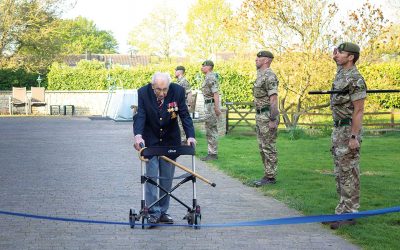For charities, social enterprises and voluntary organisations, COVID-19 has almost been the perfect storm. We’ve seen a significant shortfall in funding and the cancellation of traditional fundraising opportunities, at a time when the demand for services is increasing.
We spoke to a number of organisations who will be taking part at Volunteer Expo, now rescheduled to take place from 7th – 9th May 2021, about how COVID-19 has impacted them. At a time when things are very unclear, one thing that is obvious, is the generosity and commitment of volunteers are more important than ever.
The Lewis Foundation
The Lewis Foundation provides free gifts and support to adults who are going through cancer treatment. It can be a sad, frightening, and lonely experience for individuals undergoing cancer treatment, especially during this pandemic when their loved ones can’t be with them.We have been overwhelmed by the support and donations still being made to us.
We can no longer host our weekly gift packing sessions, so a small number of volunteers now pack gift bags in their own homes which are then collected to be delivered. We’ve also created alternative drop off points to minimise social contact and have been working very closely with all our hospitals to adjust the way we deliver the support packs to the wards. The hospital staff now kindly hand them out for us.
We continue to give 2500 gifts a month to the 7 hospitals we support in the Midlands.
Lorraine Lewis, Co-Founder and CEO
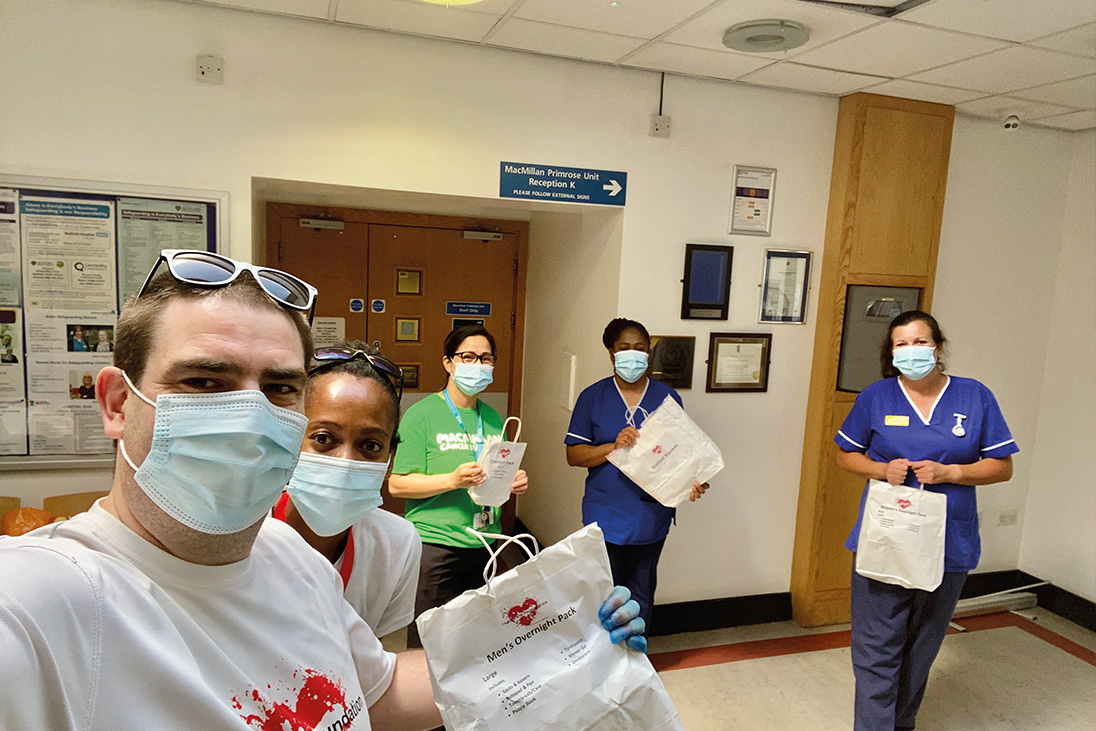

The Lewis Foundation has safely delivered 2,500 gifts per month to cancer patients in 7 Midlands hospitals.
Blue Cross
Blue Cross has always been there for pets and the people who own them, and this hasn’t changed even with the outbreak of COVID-19. The other thing that hasn’t changed is the amazing dedication from our volunteers! Whether they continue to help on the front line in our clinical or rehoming settings, have had to pause their role completely, or are now helping in a different way, their support has been steadfast.
Our volunteers have really stepped up to help with fostering pets; around 60% of Blue Cross pets are now in foster care and 555 have new homes, taking the pressure off our centres and allowing teams to work within the social distancing rules.
Whatever the future looks like for Blue Cross; our volunteers will always be part of it.
Libby Duffield, Volunteering Development Partner
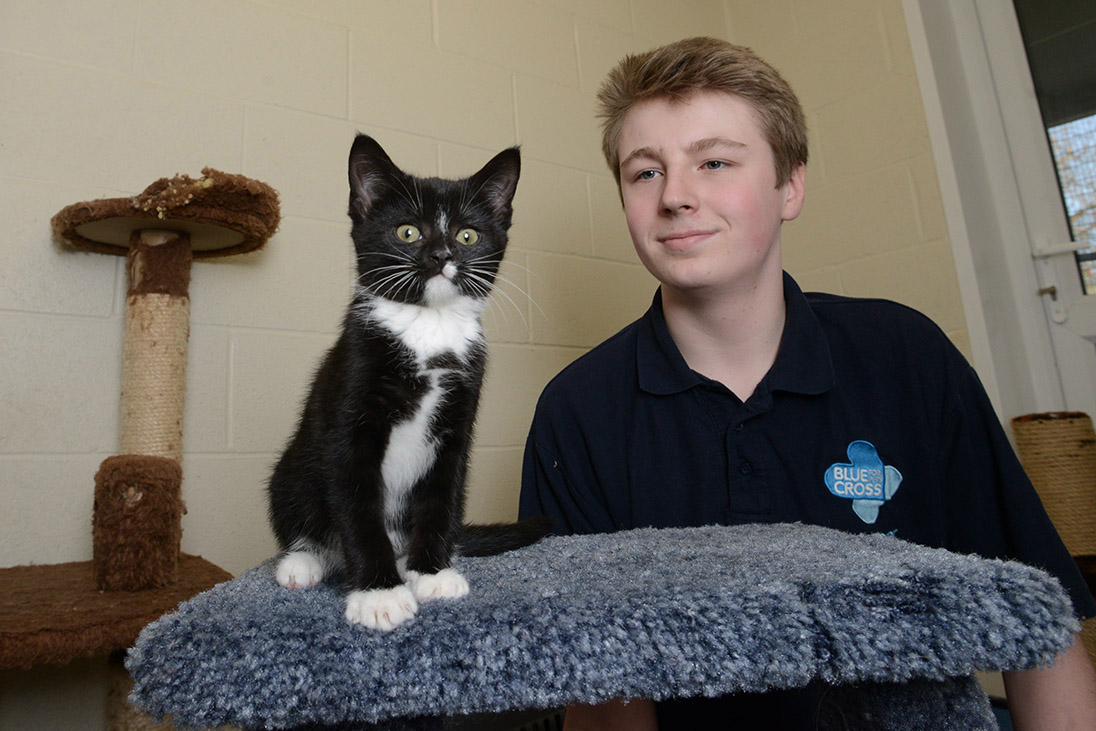

Blue Cross volunteers have helped to rehome over 550 pets as their centres are reshaped to comply with social distancing guidelines.
Aquabox
Since the outbreak of COVID-19, Aquabox’s depot in Derbyshire has been in virtual lockdown, but this hasn’t meant our charity’s work has stopped.
During the past few months we have despatched, with our partner agency, Jubilee Outreach Yorkshire, our third delivery of aid in two years to Yemen, sent both air and sea shipments of aid to the Bay of Bengal in the aftermath of Super Cyclone Amphan and finally sent aid to Syria, working with Hand in Hand for Aid and Development. We have an aid package prepared in our warehouse for our fourth Yemen shipment and boxes waiting to reach Nepal. We are preparing for the inevitable hurricane season.
All in all quite a busy time for us. Not bad for a volunteer-led Rotary charity!
Roz Adamson, Trustee
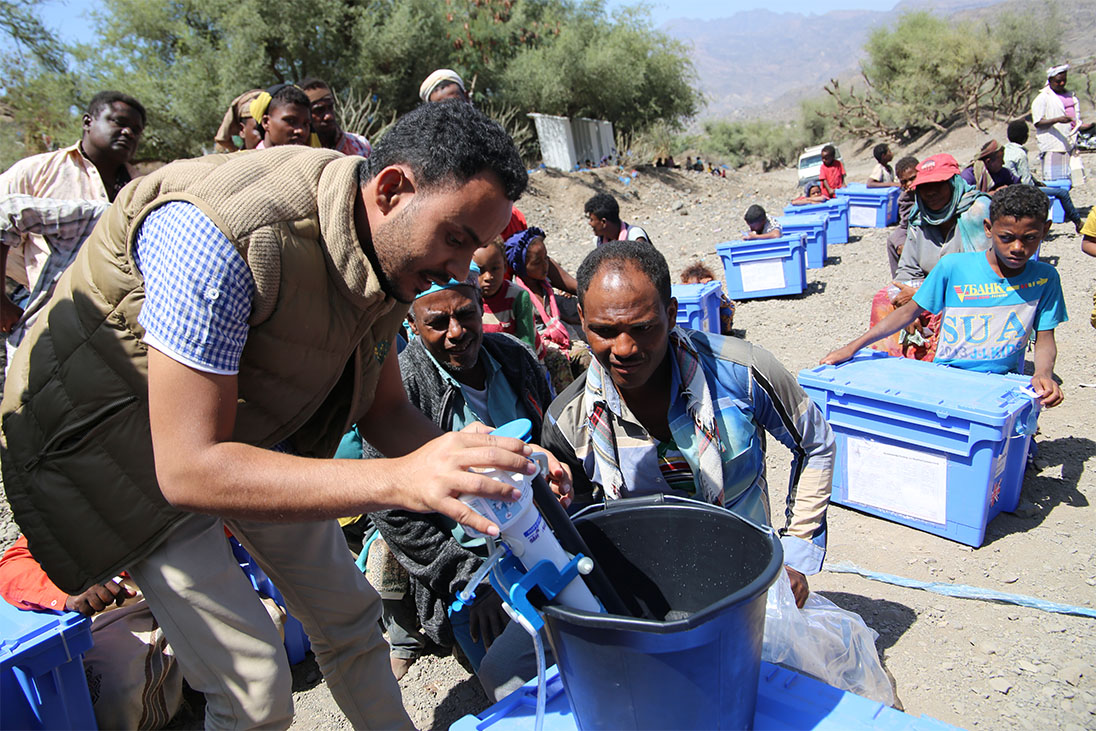

Despite the charity shutting down its depot during the pandemic, Aquabox has still been able to sent vital aid around the world. Above, an Aquabox water filtration pump is demonstrated to communities in Yemen.
Marie Curie
At Marie Curie, we have seen an increase in calls to our information and support, and bereavement lines during the pandemic, while our hospice and community nursing teams have had to adapt how they care for people, both with and without coronavirus, at the end of life while wearing PPE.
Our volunteers have helped distribute PPE to nursing teams across the UK and supported our Emergency Appeal by sharing our need to raise £2.5 million per week to continue our services for people living with a terminal illness, and their loved ones.
Our volunteers are vital in helping us continue to provide expert care and support at a time when people need it most. Marie Curie is calling on everyone to #UniteInMemory during a day of reflection on March 23, 2021.
David Grout, Head of Fundraising Volunteering
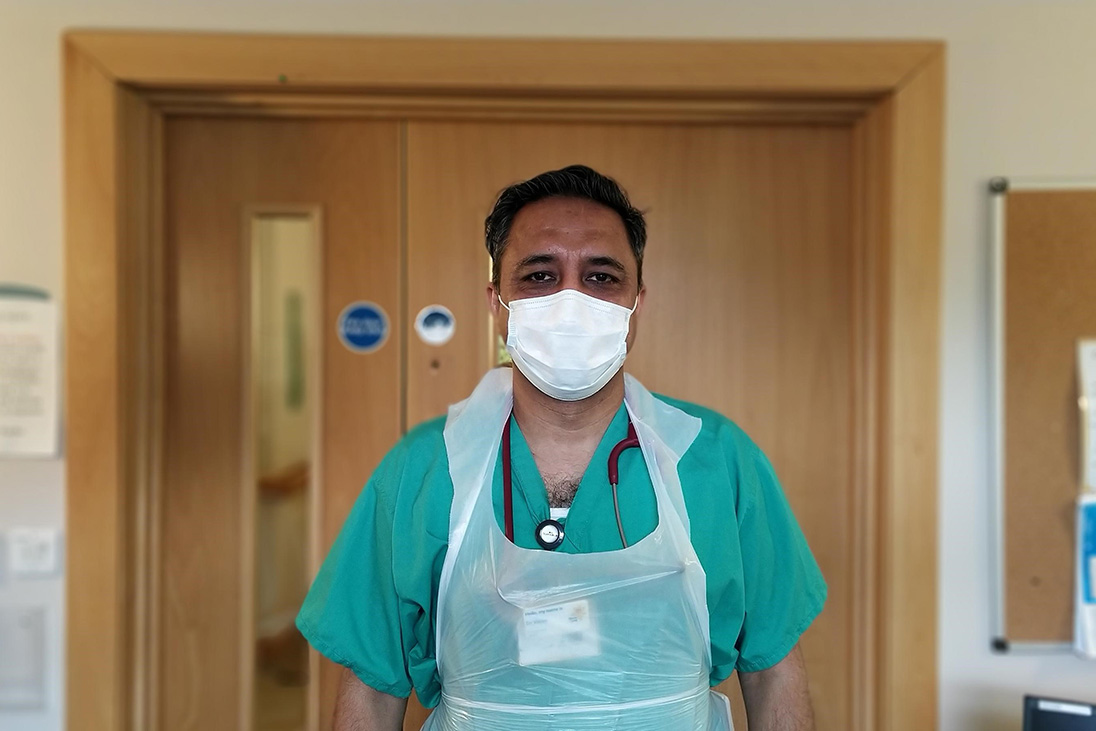

Marie Curie has seen an increase in calls for bereavement support and information.
Cancer Research UK
In the 1970s, less than a quarter of people in the UK with cancer survived. But over the last 40 years, survival has doubled – today half will survive. Our ambition is to accelerate progress and, by 2034, see three-quarters of people surviving the disease for ten years or more.
But the truth is, COVID-19 has slowed us down. Right now, millions of people are waiting for cancer screening, tests and treatment and thousands of cancer patients are having their diagnostic tests and treatment altered, delayed or even halted.
In the last few months, we’ve seen a large drop in our income, forcing us to cut our research spend by around £44m. Our shops were closed, our events cancelled.
We’re absolutely committed to supporting people affected by cancer, who need us more than ever during this pandemic. Many of our incredible researchers were able to join the fight against the coronavirus directly or work to understand its impact on people with cancer.
Our volunteers have been critical to our comeback. With our shops able to reopen from the end of June, volunteers rolled up their sleeves and helped us get back to business. Many volunteers fundraised, others told their stories to raise awareness.
For vital cancer diagnosis and treatment to get back up and running safely, we need governments across the UK to ensure cancer services are taking place in COVID-protected ‘safe spaces’. These safe spaces are already being set up, but not quickly enough.
To make this change happen, nearly 4000 voluntary campaigners around the UK have contacted their local politicians, encouraging their support.
If you would like to support us to influence Government at this time, visit @CRUK_policy on Twitter or search campaign CRUK.
Laura Berry, Communications Manager
Last week we announced devastating cuts to both research funding & jobs.
We're doing all we can to protect progress for patients, but we can't do it alone.
Together with @AMRC we're asking Government to protect our sector's vital contribution to UK science #ResearchAtRisk 1/2 pic.twitter.com/fUHkBdcpwG
— Cancer Research UK Policy (@CRUK_Policy) July 20, 2020
Mercy Ships
Mercy Ships uses hospital ships to deliver free, life-changing, and life-saving surgeries to the world’s poor. We also train local healthcare professionals to leave a legacy of change in the nations we visit.
The full impact of COVID-19 on the people we serve in sub-Saharan Africa is still unfolding, but we are continuing to support our African partners. We have moved many of our training courses online and added new ones specifically tailored to the pandemic. We have donated essential medical supplies and PPE to eight African nations to help save lives and protect frontline workers during the pandemic.
Currently our flagship, the Africa Mercy, is in drydock and the volunteer crew are utilising the extended shipyard period to carry out maintenance and renovation onboard. We will return to Senegal as soon as possible to perform our women’s health programme.
Christine Brown, Community Partnership Manager
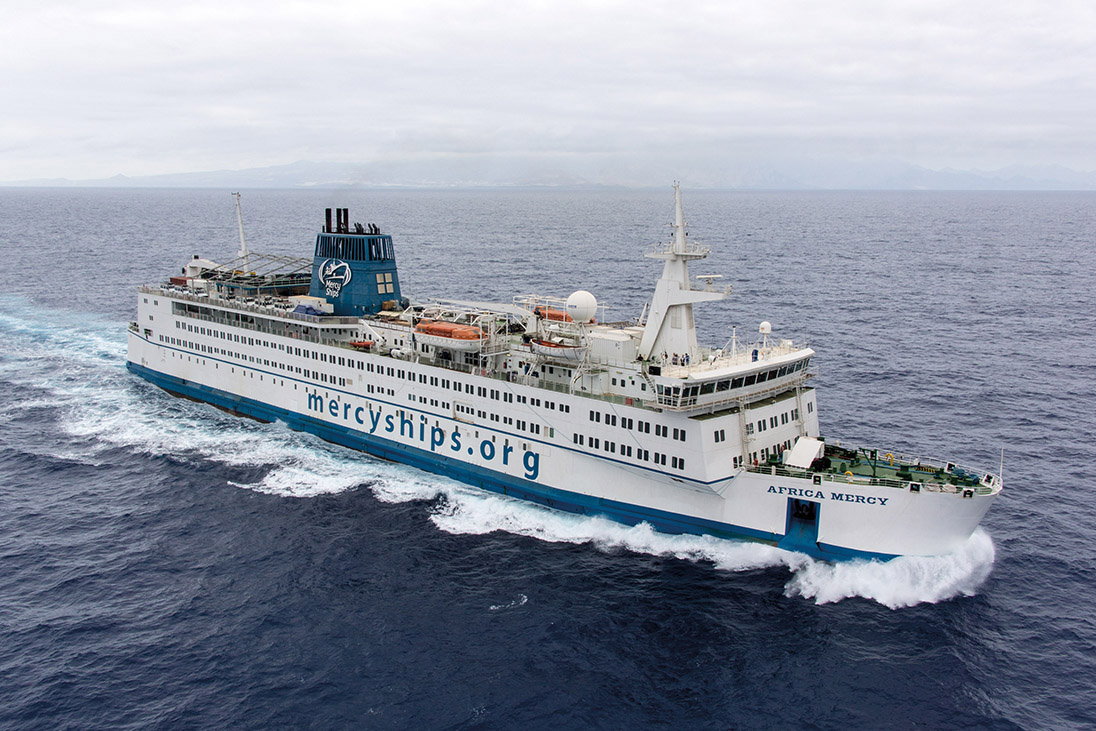

Mercy Ships’ hospital ship, the Africa Mercy, is in drydock and undergoing renovations during the pandemic.
Motor Neurone Disease Association
With MND putting people at very high risk, shielding was paramount to minimise the risk of catching coronavirus. All visits by MND Association volunteers to people with MND stopped overnight, as did meetings of the 80 volunteer-led branches and support groups. Instead, volunteers were retrained and upskilled to deliver one-to-one and group support online using video platforms, ensuring people with MND could access advice, help and companionship.
Within weeks of lockdown, 240 volunteers joined an effort to call every person with MND that we knew about. Almost 3,400 people were offered support and ongoing contact, with volunteers and staff.
This online support has proved so popular, a full programme is now being rolled out and extended to those who have been bereaved. Volunteers are supporting online activities, meetings and peer support with an anticipation that virtual activities will have an increased role to play in the future.
Chris Wade, Director of Engagement
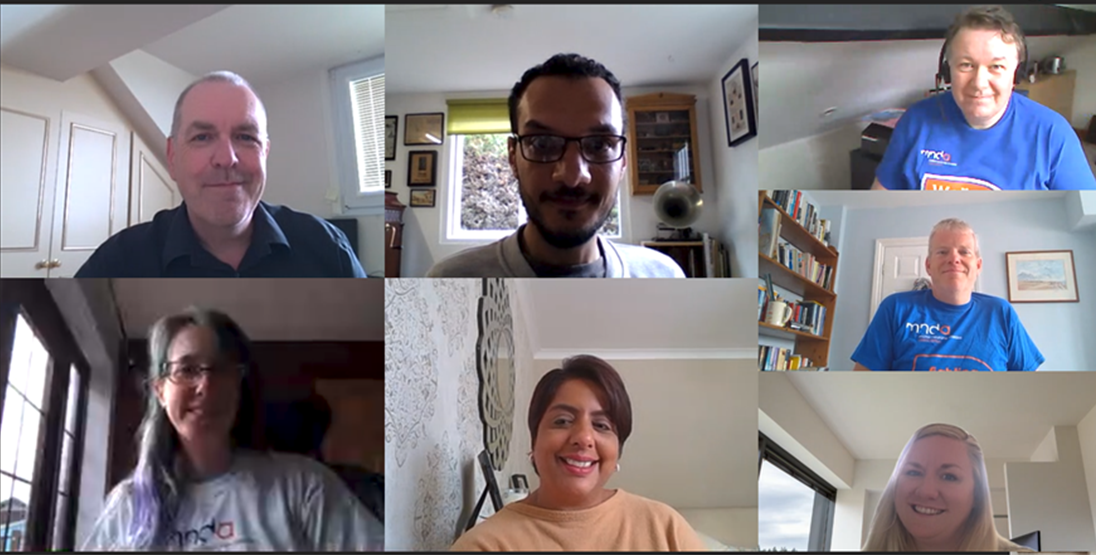

Volunteers for MND Association were retrained and upskilled to deliver online, group support.
Tools for Self Reliance
Tools for Self Reliance delivers life changing vocational training projects in Africa, including start up tool kits donated and refurbished in the UK. COVID-19 has meant that most of these projects are on hold, and communities already living in poverty are facing increased food costs, and fewer ways to earn money because of local restrictions.
Here in the UK, our workshop has closed, but many of our volunteers have found ways to support our work from home – selling tools and items online, repairing and refurbishing tools from their own workshops.
In Africa, projects have been similarly responsive – finding ways to adapt projects, including making and distributing masks, and setting up handwashing stations in local communities.
Jemma Chambers, Head of Fundraising
Community Heartbeat Trust
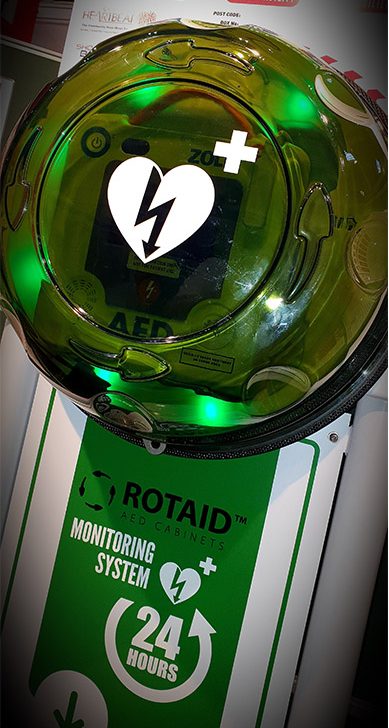

CHT’s Rotaid 247 monitors the status of defibrillators.
It is estimated by ambulance services that up to 30% of community defibrillators could be inactive or not rescue-ready at any point in time, made worse by the reluctance to check equipment during the COVID-19 pandemic. To help, Community Heartbeat Trust (CHT) recently launched the first monitored cabinet – the Rotaid 247.
The ShockBox Rotaid 247 addresses the issues of rescue ready status and the deployment of defibrillators. Aiding and supporting communities and clubs across the UK with Governance, Sustainability and Resilience with the addition of remote monitoring in community defibrillation. Caretakers are notified by email and SMS of any changes in the status of their defibrillator.
Rotaid 247 and CHT assist the community in the registration, operation and maintenance of your system. This high technology solution is simple, effective, and coupled with the other services offered by Community Heartbeat, enables a new chapter in community defibrillation.
Martin Fagan, Community Heartbeat Trust
PeaceJam UK
PeaceJam UK is almost exclusively made up of volunteers, including many Rotary members, and they have played an invaluable role in helping us adapt the way we work.
Young people are experiencing anxieties around their futures, the loss of structure, social contact and connection. In response to COVID-19, we created an online safe space to build resilience and help young people process their thoughts on some of the issues that have emerged in their lives, their communities and across the world.
We provided PeaceJam’s Compassion in Action curriculum and online training for free, to equip teachers and youth group leaders with the skills and resources needed, to help navigate these difficult topics. We are looking for volunteers who can help us connect with schools and youth groups, as well as near-peers (18-25 year olds) to mentor at our Pan-European online conference with Nobel Peace Prize winner Jody Williams in November.
Sara Belhay, Project Manager
Have you ever been involved with PeaceJam – as a participant or mentor? PeaceJam Europe is launching its first alumni network, enabling former PeaceJammers to come together. To join a Europe-wide network, visit: https://t.co/QrHOG3gkPi for details & have your input! pic.twitter.com/oAcrqWtEGy
— PeaceJam UK (@PeaceJamUK) July 30, 2020
Rotarians Eliminating Malaria in Tanzania (REMIT)
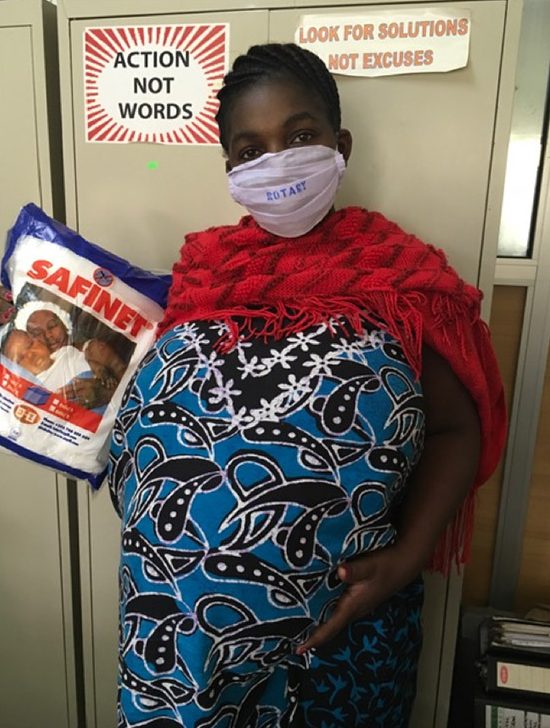

A face mask is handed out with every malaria protection net.
Because COVID-19 was mainly taking the sick, we upped our supplies of nets – we were not able to deliver and train in the schools as had previously been the procedure, but with big cooperation from the village leaders we managed to train and distribute from the village officers’ office.
Some of the medical officers, seeing our video for training allowed the money they would have claimed to instead be spent on nets. Rebecca from 3H Grants was also helpful in allowing some of Global Grant money to be used for masks. I was also able to get a donation of 5000 masks – so with every net we issued a mask.
So far Corona has not been so heavy here, we are not sure of the figures as the President stopped them being announced – I find this a good thing because people were really getting scared and I think the thought was even killing some!
We were wearing masks and washing hands at every shop or office, but now it has stopped!
Crisis
As COVID-19 took hold, it became clear the effect on the UK’s homeless population was potentially disastrous. Rough sleepers were moved quickly into hotels and as different agencies took on management, they realised that staffing them would require volunteer support.
Crisis took the lead, contacting over 8000 Crisis at Christmas volunteers. The request was simple, ‘Can you help?’. Over 800 replied that they were willing to support in a new and complex environment. Working in partnership with St. Mungo’s, Look Ahead, De Paul and The Passage, over 150 Crisis volunteers were placed into London hotels. They became a vital part of the support, both to staff and to the new guests, delivering meals, getting prescriptions, providing administration support and improving wellbeing.
To find out more about current or future volunteering opportunities at Crisis please email volunteering@crisis.org.uk.
Over the last 12 weeks, incredible progress has been made towards ending homelessness and temporary housing has been provided to thousands. But our work is not yet done, and we need your support to make sure there’s a home for all from now on: https://t.co/vQVeegCXQL#HomeForAll pic.twitter.com/I78MfC3kjN
— Crisis (@crisis_uk) June 19, 2020
Book your free tickets to Volunteer Expo
Volunteer Expo is now taking place from 7th – 9th May 2021 at the NEC Birmingham.
Get hold of your free tickets today and browse our list of exhibiting charities and organisations.









